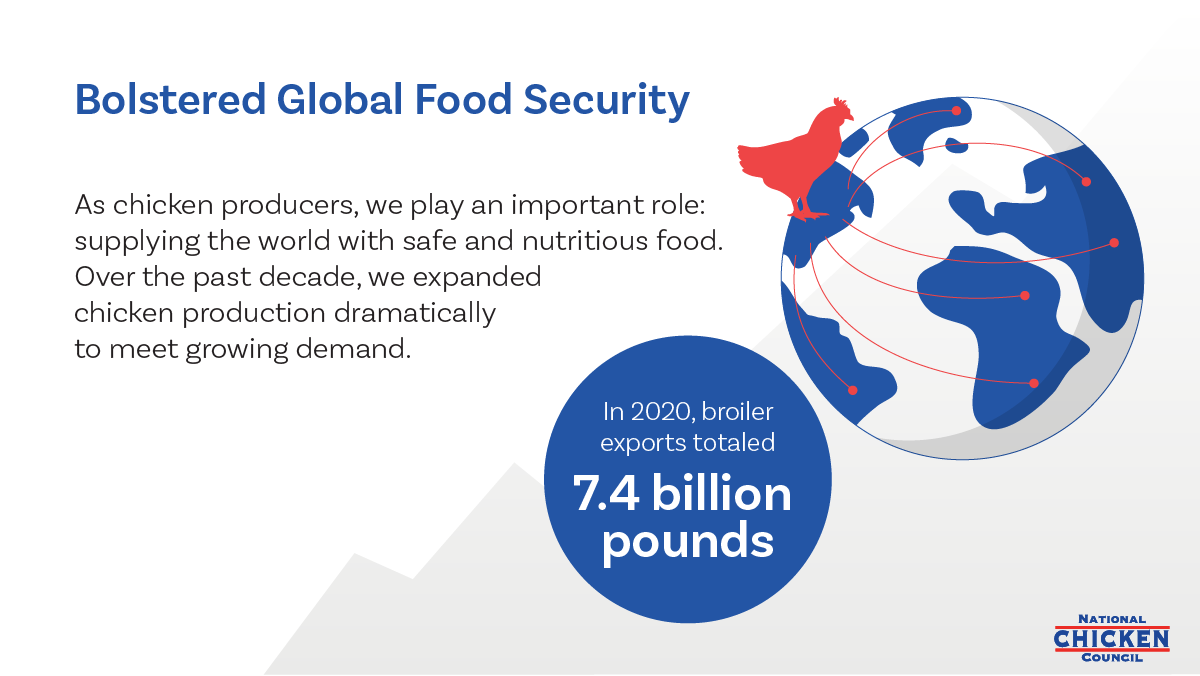- Continuing industry efforts to enhance food security
- Applying biosecurity measures to safeguard health
- Teaching others to produce chicken
Access to quality, nutritious food is more than a basic human need – it’s also a fundamental right. The National Chicken Council (NCC) recognizes each individual needs, and deserves, reliable access to sufficient, safe, affordable and nutrient-dense food. This topic was explored this week on Chicken Check In’s blog.
Also known as food security, this daily need is a serious challenge for many people, both in the U.S. and around the world. That’s why the U.S. chicken industry is taking a 3-pronged approach to meet increasing food security demands by:
Continuing Industry Efforts to Enhance Food Security
The U.S. chicken industry now produces 21% more chicken by weight than 10 years ago. American chicken production not only feeds our nation, but people all over the world. In 2020, broiler exports totaled 7.4 billion pounds. But with today’s current food security issues and the U.N. predicting a global population of 9.7 billion by 2050, there is more work to be done.

The U.N. Sustainable Development Goals (SDGs) guide our responsibility approach. Collectively, the 17 SDGs provide a blueprint for a better and more sustainable future for all people and the planet. The SDGs present a challenge and an opportunity – a global call to decrease poverty, hunger, climate change and inequality by 2030. We are particularly inspired by 4 of the SDGs:
- Goal #2: Zero Hunger – End hunger, achieve food security and improved nutrition, and promote sustainable agriculture.
- Goal #8: Decent Work and Economic Growth – Promote sustained, inclusive and sustainable economic growth, full and productive employment, and decent work for all.
- Goal #12: Responsible Consumption and Production – Ensure sustainable consumption and production patterns.
- Goal #17: Partnerships for Goals – Strengthen the means of implementation and revitalize the global partnership for sustainable development.
Applying Biosecurity Measures to Safeguard Health
One way the U.S. chicken industry seeks to bolster food security is by implementing what are known as “biosecurity measures.” Biosecurity measures are steps taken to reduce the risk of introduction and spread of diseases. These practices and innovations go hand in hand with veterinary care to keep the birds healthy, while also reducing antibiotic use.
Teaching Others to Produce Chicken
Leading animal health company Zoetis is one example of educating other nations about chicken production to support food security. In Africa, Zoetis has committed to treating 200 million chickens by 2025. In the 4 years since African Livestock Productivity and Health Advancement (A.L.P.H.A.) launched, Zoetis has administered 1.7 billion doses of vaccines and medicines, established 10 serology labs, and reached hundreds of thousands of farmers, veterinarians and para-veterinarians via training programs. This empowers these individuals to improve food security for themselves, their families and their communities.
To learn more about how the U.S. chicken industry takes action to address food security, view the complete inaugural NCC sustainability report here.

